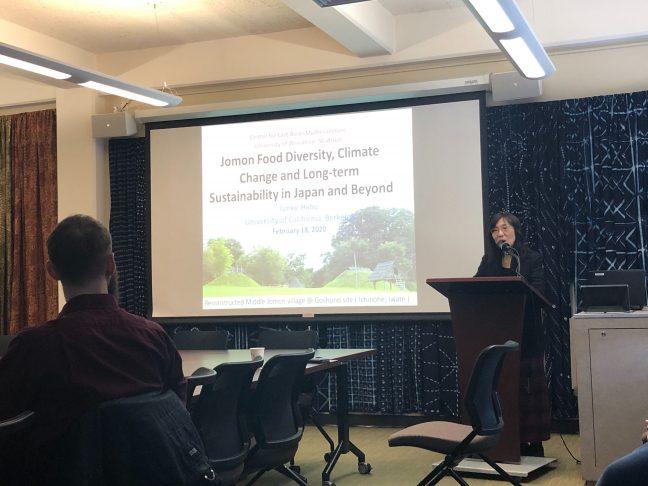Junko Habu, a professor from the University of California-Berkeley, spoke to the Center for East Asian Studies about resilient food systems in Japan, Tuesday afternoon.
Habu works in the anthropology department at Berkeley studying the importance of food and subsistence diversity. She discussed a three-year-long project she conducted starting in 2010.
This project looked at alternative farming methods and looked into whether large-scale, homogeneous agricultural production was actually more efficient.
Habu’s hypothesis was that this large-scale agriculture would be able to support a large population for a short period of time but would make society more vulnerable in the long run.
Habu said she saw an example of this vulnerability after the earthquake and tsunami that struck Fukushima in 2011.
“The next day after the earthquake in Japan pretty much all the bread and milk disappeared from grocery stores, the second day, veggies, meat they all disappeared,” Habu said. “The third day canned food disappeared, the fourth day even toilet paper disappeared. So it doesn’t really matter how much you can import from overseas in four days, Tokyo becomes dysfunctional.”
Habu and her team used archaeological data from the ancient Jomon period in Japan, as well as ethnographic interviews with current Japanese residents to conduct their research.
They found the three most prevalent elements of sustainable food production were resilience, traditional environmental knowledge and that landscapes are both socially and ecologically structured.
Habu said they found successful, self-resilient societies have multiple backup plans such as diverse crop options, ample food storage, inherited cultural knowledge and the ability to trade surplus food.
Limnologist discusses UW’s role as first university limnology department
This traditional knowledge often guides subsistence farming and is passed down generationally, Habu said.
“It’s usually very closely tied to what you do, sometimes you may not even notice it’s knowledge, it’s much more tied to practical skills,” Habu said. “Often embedded in various beliefs.”
Using the data gathered from the Jomon archaeological sites, Habu noticed the Jomon population decreased sharply after they intensified their reliance on plant food.
While Habu cannot say for sure, she hypothesized this population decline may have been linked to the intensification of subsistence agriculture. She said this intensification may have increased the complexity of the society, increasing social inequality and making it less resilient.
Habu said archaeologists and researchers should work to incorporate the values of locals more in future studies.
“Archaeologists need to talk more with those who are concerned with local and global environmental issues,” Habu said. “We do need more collaborations with local environmental movements and to listen to local stakeholders.”












